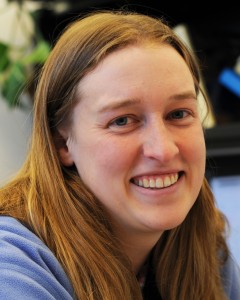
Laura Boucheron
Tell us a little about yourself. What is your position here at NMSU, and what are your research interests?
My name is Laura Boucheron. I graduated with my BSEE and MSEE from NMSU and my Ph.D. from UC Santa Barbara. I am currently an Associate Professor in Electrical Engineering. My research interests are where image processing and machine learning, particularly deep learning, overlap. I am particularly interested in interdisciplinary applications, e.g., analysis of astronomy images.
How do you define data science?
The methods that allow one to extract useful and actionable information from data.
How do you incorporate data science techniques into your research?
I guess I would say most of my research is data science.
How did you first discover data science, and what training (formal or informal) did you receive in it?
I thought I was going to specialize in electronics in undergrad. I took Digital Signal Processing (DSP) my senior year mostly because there wasn’t anything else that I particularly wanted to take and I heard the instructor was good. That class was when I realized I actually wanted to specialize in signal processing. When I took image processing early in my graduate career, I found my true calling. Image processing speaks to my quantitatively oriented thinking and the fact that I am a very visual person when I learn and organize my thoughts. While my formal education includes the traditional classes in signal and image processing, I taught myself machine learning as I completed my Ph.D. and deep learning as I have progressed in my career in academia.
What data science skill sets do you think are particularly important/beneficial for graduate students looking to work outside of academia—say, in industry or the public sector?
Programming, programming, and programming. I am particularly partial to python as it is a ubiquitous language used for scientific computing. But good programming skills in a language are an absolute necessity. Once you know one language, it is easier to learn another. Oh—did I mention programming?
A student wants to get into data science but they don’t know where to start. What advice would you give?
Learn a programming language—take a course, take an online course, complete online tutorials. Find a researcher who is doing research you find interesting and talk to them about it. Look for research opportunities as a student.
Are there any challenges (technical or ethical) that you think data scientists need to address?
Many methods for machine learning are either inherently black box-ish or are used in a very black-box manner. I think the ability to not only implement a successful machine learning algorithm but to also understand why the algorithm is behaving as it is will be critical moving forward.
What makes you most excited about data science?
You can never get bored. There’s always a new application area to learn about.